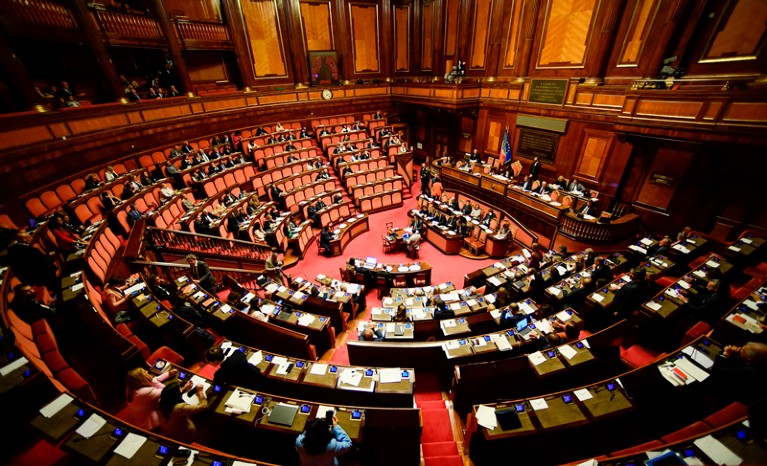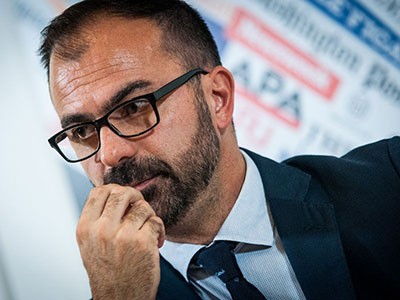
Italy’s parliamentarians must work with ministers to ensure that the planned national research agency is free from political interference.Credit: Filippo Monteforte/AFP/Getty
Italy is a rare example of a major world economy without a research funding agency that operates independently of a science or research ministry. For years, ministers and civil servants have had a say in what research gets funded. But that could be about to change.
Prime Minister Giuseppe Conte’s government says it is committed to creating an independent National Research Agency (ANR) and has begun drafting its structure and functions. About time, too, say researchers who are tired of insufficient funds coming from opaque funding mechanisms. That said, they are worried that some politicians might wish to become too closely involved in the new agency’s affairs (see Nature 575, 424–425; 2019).
It’s a valid concern, and the fledgling agency will need to be protected. Paradoxically, it is politicians who must perform this crucial task, especially Italy’s team of research ministers — led by political economist Lorenzo Fioramonti. It won’t be easy, and Fioramonti and his team must steel themselves for the task ahead.
Conte pledged to establish the ANR in September, in his first speech as leader of a new coalition between the populist Five Star Movement and the centre-left Democratic Party. He added that financial support for research would also be increased.
Italy’s plan to create €300-million research agency draws fire
The ANR, Conte said, would be modelled on science funding agencies in other European countries, which operate under the broad principle that politicians decide how much to allocate for research and have a say in strategic funding priorities. However, politicians do not decide which proposals are funded; nor are they involved in setting criteria for awards, or in evaluation. These tasks need to be performed independently, by subject experts chosen by the research community.
Under a proposal that has been presented to Italy’s parliament as part of the 2020 budget, the ANR will receive €25 million (US$28 million) for 2020, then €200 million for 2021 and €300 million annually from 2022. These are small sums by the standards of similar-sized economies, but it’s a start. The ANR will coordinate research at universities and public research institutes. It will also fund “highly strategic” projects, and encourage participation in international research initiatives and cooperation with the private sector.
But the fine print — or lack of it — is causing concern. The current draft law says that the ANR’s nine-member governing board will be nominated by university presidents, as well as representatives from the prime minister’s office and government ministries. This is an unusually high level of involvement from political representatives, fuelling fears that the agency will come under the influence of politicians.
In line with international best practice, the ANR should also appoint a network of independent research advisers, drawn from various disciplines, to oversee the quality of funding calls and of funded applications. But the proposal presented to parliament has no such provision.
Many researchers are undecided on whether to see the glass as half empty or half full. They welcome the new support for research, but some would have preferred for Italy’s existing funding bodies to be made part of the new agency. They are also unhappy that researchers and their representative organizations have been left out of the loop.
That said, researchers do have two things on their side. First, Fioramonti has said publicly that he is unhappy with the draft law and has promised to convince parliament to amend it. Second, a preliminary screening of the budget law by Italy’s court of auditors has highlighted the question of independence and the auditors have asked for more clarity on how this will be achieved.
Fioramonti has said he is determined to do what he can to establish a healthy distance between the ANR and politicians, to consult the scientific community and to ensure that the ANR is governed to the highest possible standards of quality and probity.
Italy’s researchers, and particularly the future generations whose careers the ANR will fund, need the minister and his team to follow through on these promises. Independence, transparency and trust are vital for an agency that could shape research in Italy for decades to come.

 Italy’s plan to create €300-million research agency draws fire
Italy’s plan to create €300-million research agency draws fire
 Memo to Italy’s president: your researchers need you
Memo to Italy’s president: your researchers need you
 Italian scientists won’t miss departing Prime Minister Matteo Renzi
Italian scientists won’t miss departing Prime Minister Matteo Renzi





